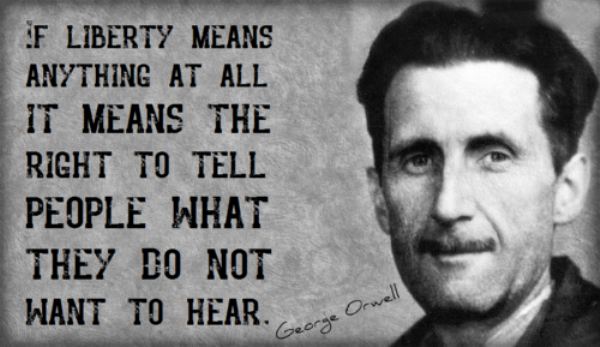Freedom of speech – back to basics
The ratcheting
up of censorship in the US of conservatives, libertarians, or even liberals who
do not ascribe to all the dogmas of the media elite, is alarming. It is no
surprise that trust in the media has fallen to the lowest
level on record.
Among those recently censored on Twitter are the oldest and third most syndicated newspaper in the US, the New York Post; the White House Press Secretary; Trump’s reelection campaign; and the President himself.
This is the same
platform that does not ban Ayatollah
Khamenei, supreme leader of Iran, who
openly wishes to commit genocide on the Israelis. It does not ban the account
of Louis Farrakhan, a habitual
anti-Semite who praised Hitler as
‘a
very great man.’ Twitter tolerates left
wing rioters such as those associated with the so-called
Antifa. And of course it does not ban
left wing celebrities who tweet vile things on a daily basis, like Madonna,
when she expressed her desire to blow up the White House in 2017. Nor does
Twitter’s guidelines see the need to remove child
pornography.
Many who do not
like the biased and censorious atmosphere of Twitter left and went to Parler
(causing a 10% fall in Twitter stocks), an alternative to Twitter and Facebook
that marketed itself as a free speech platform, whose role is not to dictate
what can and cannot be said – what Twitter and Facebook pretend to be. However,
like a well-oiled machine, Google,
Amazon and Apple colluded to remove
Parler from their platforms, essentially wiping it from existence, and denying
millions of users their public square.

Parler was the No.1 app on AppleApp Store before being suspended
All this brings
to mind ironically Rosa Luxemburg’s pithy quote “Freedom is always and
exclusively freedom for the one who thinks differently.”
It seems that
while most people will profess a reverence for the freedom of speech, few actually
understand what it means, including journalists and lawmakers who celebrated
Trump’s ban. Hence, whenever challenged by people of bad faith, people are
ready to give it up. It might therefore worth re-hashing the philosophical
roots of what freedom of speech truly entails.
At its core, the
way society should approach this freedom is encapsulated by Voltaire’s famous
quote, “I disapprove of what you say, but I will defend to the death your right
to say it.”
Freedom of
speech is essentially a negative freedom, one that ensures freedom not ‘to’ but
‘from’, in this case, from censorship. Hence anyone or any institution that
wish to apply any filters, any gags, or any barriers against people saying what
they think are anti-freedom of speech.
The
philosophical root for this has been laid out in three pieces of writing – John
Milton’s Areopagitica (1644), Thomas
Paine’s The Age of Reason (1794), and
John Stuart Mill’s On Liberty (1859).
The essential point, variously made by these great thinkers, is that when any speech is denied or violated, it is not only the speaker’s right of expression that is offended. What is also denied is the right of everyone else to hear that person’s opinions.
Anyone who
denies the speech of others enslave themselves to their own opinions. For even
a wrong or heretical opinion expressed by another may have some truth embedded
within it, and might at the very least challenge us, the listeners, to reflect
on how we know the things we think we know, and whether our beliefs are well
founded or simply regurgitated dogma.
Christopher
Hitchens said in a sublime speech
that laid out the heart of the argument for freedom of speech, “don’t take
refuge in the false security of consensus.” Not only is this because this is
lazy and childish, the consensus has also been proven wrong so many times in
history.
In early 2016, I
wrote an essay titled ‘In
defence of insolence’, where I point out
that almost all the great cases of persecutions for ideas are those of great
individual thinkers who had pushed back against the consensus and incurred the
wrath of the censorious and powerful, who, like Twitter, Amazon, Apple and Facebook today,
wished to and often did, eliminate them (literally and metaphorically) from the
conversation. Socrates, Hypatia, Galileo, Giordano Bruno, George Orwell,
Mandela, Salman Rushdie, Pym Fortuyn, Ayaan Hirsi Ali, Malala Yousafzai, the
Charlie Hebdo editors.
In a time when
minority status is celebrated across superficial categories of sexuality,
gender, and race, it’s curious that this elevated status is not given to the
only thing that really matters, which is the minority of opinion. To be for the
censoring of people who think thoughts you disagree with would mean that you
would be willing to allow for the mistreatments of those listed above, not to
mention risk losing their contributions to the world.
The cabal of
politics, media, big tech, academia and Hollywood, who wish to control thought
and to kill oppositional speech should be rebelled against by all who value freedom
and have the self-respect to think for themselves.






Comments
Post a Comment